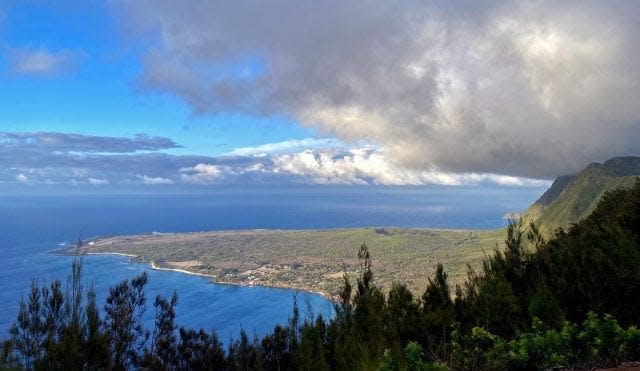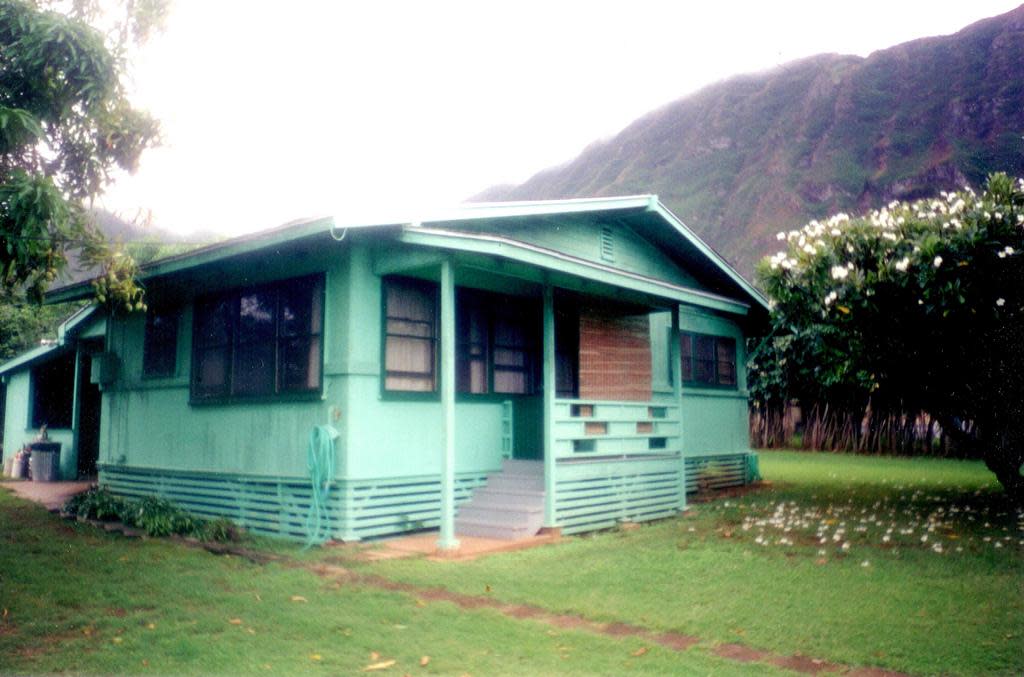'It's the best medicine for us': Hawaii's Kalaupapa eases pandemic restrictions

The Hawaii Health Department has restored visitor privileges to former Hansen’s disease patients and resident staff at Kalaupapa who were prohibited from seeing their families and friends for more than two years during the pandemic.
The state imposed far stricter restrictions on the secluded peninsula on Molokai than those enacted in the rest of the state, leading some patients to beg for hugs even as much of the rest of the world was growing to accept COVID-19 as a manageable part of everyday life. Some patients who suffer from memory loss due to old age are occasionally confused about living in lockdown from the coronavirus with earlier experiences of being shunned by the world as a leprosy patient.
But the state has recently relaxed its blanket no-visitor policy enacted in March 2020. As of November, Kalaupapa residents may seek approval for sponsored visits from up to six vaccinated guests at a time, the health department said. The total number of visitors in the settlement is capped at 25.
'What makes Hawaii Hawaii?': Exploring Hawaiian heritage at Haleakalā National Park
Hawaii vacation: Save by booking cheaper, more sustainable options to a rental car
Patients and staff have been elated to restore a bit of normalcy to their lives, according to Miki‘ala Pescaia, a Kalaupapa National Historical Park ranger.
“It’s the best medicine for us,” said former Hansen’s disease patient Meli Watanuki, 88, who recently enjoyed a visit from friends from Honolulu for the first time in three years.
Masking, social distancing restrictions remain
The coronavirus pandemic marked the second time that Kalaupapa’s former patients have been forced into isolation due to rampant disease. But where they were once brutally separated from the rest of society for the protection of others, they have been isolated during the COVID-19 pandemic for their own protection.
Other pandemic rules have also eased on the 10,700-acre peninsula, which is incorporated as Kalawao County and managed by the health department.

Masks can now come off outdoors so long as people maintain a 6-feet distance between them. But masks remain mandatory indoors, and indoor gatherings remain capped at five people.
With approval from the health department, certain outdoor activities and gatherings of more than five people have also resumed on a case-by-case basis. There will be a Christmas party and door-to-door caroling this month.
Hawaii DOH spokesperson Kaitlin Arita-Chang said the department’s priority is protecting high-risk members of the Kalaupapa community from COVID-19. None of the former patients who reside in the settlement have contracted the disease.
Don't be that tourist: Here's how to respectfully visit Hawaii, have an authentic trip
Take it from Hawaii locals: You won't regret these 8 activities when you visit the islands
'I'm so happy this is my home'
Four patients in their 80s and 90s remain in Kalaupapa of the many former Hansen’s disease patients who chose to continue living on the rugged peninsula despite the 1969 repeal of the Hawaii law that had exiled them there until death. An estimated 8,000 people afflicted with the illness were banished there from 1866 to 1969.
The last living patients reside in the settlement with support from the health department, which provides them with furnished homes, nursing staff and stipends for food and clothing.
Watanuki was 18 when she was diagnosed with Hansen’s disease in 1952 in her native American Samoa. Thinking she had overcome the illness, she moved to Honolulu in 1960. But signs of the sickness returned in 1964. After undergoing treatment, she elected to relocate to Kalaupapa in 1969.
“I’m so happy this is my home,” she told Civil Beat in an interview this week.

Today Watanuki begins her mornings at church before going to work at the Kalawao Store. In the afternoon she cleans and pulls weeds part-time for the National Park Service at St. Philomena Church in the original Kalawao Settlement area.
She is buoyed by faith in God and reverence for Saints Father Damien and Mother Marianne Cope, who dedicated their lives to caring for Hansen’s disease patients in Kalaupapa despite risks to their own health.
Pandemic restrictions have been difficult, Watanuki said, but she understands that tight controls imposed by the state are intended for her protection.
When will tours return?
Although personal visits have resumed, public tours remain closed. As co-owner of Saints Damien and Marianne Cope Molokai Tours, Watanuki said she’s eager for tourism’s return. Health department administrators have told her that tours are expected to start up again in 2023, she said.
Watanuki noted that there have been numerous federal employees who’ve traveled from the mainland to work in Kalaupapa in recent months.
“Why is it different?” she asked, adding that tourists come in small numbers and leave after a few hours, whereas federal workers typically stay on the peninsula for weeks or months.
Sister Alicia Damien Lau, a Catholic nun who resides in Kalaupapa, said public tours remain shut down due to concerns that visitors from other places could spread the virus.
“We don’t want people coming into Kalaupapa that nobody knows,” she said. “So it’s strict. But it’s good. It’s to protect our kupuna.”
Iconic Haena State Park cracked down on illegal campers: Here's what happened.
'Our deities are alive and well': Native Hawaiians find a spiritual connection to Mauna Loa eruption
Next week, for the first time in three years, the Kalaupapa Lion’s Club will resume its annual Christmas party with some semblance of normalcy. There will be food, gifts and a chance to win an ukulele.
The party will take place outdoors - a pandemic precaution far less stringent than those imposed on the event last year when party-goers could only drive up in a vehicle to collect gifts and a meal to take home and enjoy in solitude.
The health department has also approved Christmas caroling for patients and staff.
This story was published in partnership with Honolulu Civil Beat, a nonprofit newsroom doing investigative and watchdog journalism relating to the state of Hawaii.
This article originally appeared on USA TODAY: Visitor privileges returned to Hawaii's Kalaupapa after COVID-19 ban
